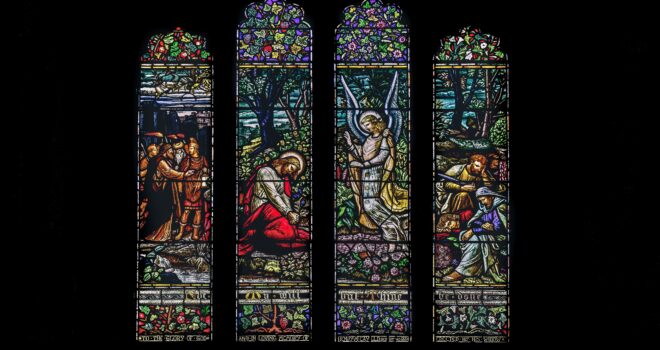Finding Purpose through Christlike Prayer
I recently visited a religious sister who was hospitalized with a terminal case of cancer. I was about to pray for her when a thought crossed my mind, “Suppose you pray for her, and she does not recover. Suppose she never survives this cancer. Wouldn’t it be wicked of you to give her false hope […]



I recently visited a religious sister who was hospitalized with a terminal case of cancer. I was about to pray for her when a thought crossed my mind, “Suppose you pray for her, and she does not recover. Suppose she never survives this cancer. Wouldn’t it be wicked of you to give her false hope by praying for her? What use is your prayer when you know that her condition is terminal?” I ignored that negative thought and prayed for her fervently and with faith in God.
I still prayed for her because I know that prayer is not just about getting something from God. Healing is very much God’s business and He heals when we pray for healing with strong faith and the sick person is properly disposed to receive the healing. But prayer is also connecting with God and finding purpose in the things that we face in life. We must not reduce prayer to simply getting God to do something for us or give us what we need. We must also pray to be faithful to our God-given purpose in life.
St. Mark tells us about Jesus’ prayer life in these words, “Rising very early before dawn, He left and went off to a deserted place, where He prayed.” (Mk 1:29-39) What was He praying for? He surely was not praying for success in His healing ministry because He was successful already. He healed Simon’s mother-in-law the previous evening when they told Him about her, “He approached, grasped her hand, and helped her up. Then the fever left her.”
He was obviously not praying to avoid demons because He faced so many of them already and triumphed, “When it was evening, after sunset, they brought to Him all who were ill or possessed by demons.” He most likely was not praying to be successful in His deliverance ministry because He was already successful, “He cured many who were sick with various diseases, and He drove out many demons.” Then why was He praying so early in the morning?
Jesus prayed primarily to connect with His Father and to be faithful to His Father’s purpose for Him in good or bad times. Through His time of prayer, He knew that the moment had come for Him to let go of the success of His ministry and continue to whatever may come, “Let us go on to the nearby villages that I may preach there also. For this purpose have I come.” Though “everyone was looking for Him,” Jesus would not allow others to dictate His own purpose in life.
Jesus kept faithful to His Father’s purpose for Him by His loving contemplation of His Father always. When He was accused of healing on the Sabbath, He responded, “Truly, truly, I say to you, the Son can do nothing of His own accord, but only what He sees the Father doing; for whatever He does, that the Son does likewise.”(Jn 5:19) His prayer life was primarily about entering into the Father’s purpose for Him and being faithful to that purpose too.
What happens when we lose sense of the divine purpose in our lives? Then we begin to speak and think like Job, “Is not man’s life on earth a drudgery? Are not his days those of hirelings? He is a slave who longs for the shade…I have been assigned months of misery, and troubled nights have been allotted to me…I shall not see happiness again.”(Job 7:1-3, 7)
Job is so fixated on his travails that he does not look forward to God’s intervention. His life has no meaning at all at this point. He forgets all the good that he has done for God in the past and how God has also been faithful to him. He is overwhelmed by this perceived senselessness of life because he is only thinking and talking to himself. He does not enter into prayerful listening to God.
My dear brothers and sisters in Christ, every gift of God and every event that He permits has a purpose. It is so easy for us to impose our own purpose on the gifts that God offers to us. We can have the warped idea that our bodies are for chemical or surgical mutilation in transgenderism. We can become crippled by an excessive fear of suffering because we cannot find meaning in it. We can also allow the world to dictate to us its own purpose for what we have received from God, making us fall into agnostic, consumeristic, and hedonistic mindsets.
We must pray like Jesus if we are going to be faithful to that purpose of God for us all the time.
Firstly, we must sacrifice something to be in communion with God. Jesus sacrificed some hours of sleep to spend time with His Father in prayer. He actually cut down His time of late-night socializing to be awake and alert for an encounter with the Father in the morning. We cannot pray like Jesus when we indulge in things, even things that may be necessary.
Secondly, we must seek silent moments alone with God. This interior and exterior silence is indispensable for a fruitful communion with God in prayer. I have found that a few silent moments in the Blessed Sacrament allow God to impress His own purpose in our hearts and give us the grace to be faithful to that purpose.
Thirdly, our prayer must bring us to seek to fulfill the will of God in all things. Jesus did not seek His own will or the will of those whom He served. He did not let anything, or anybody get between Him and His Father’s will. We cannot seek the purpose of God for us in our lives while holding on to our own self-will and personal agendas.
Fourthly, our prayer must dispose us to loving serving of all persons. Jesus is ready to leave those who appreciate Him and move on to others who may not appreciate Him. Our prayer life must make us available to love and serve all others. Such prayer should make us like St. Paul who said, “I have become all things to all, to save at least some.”(1Cor 9:23)
Lastly, our prayer must not be limited to asking God for the things that we need. Indeed, Jesus commands us to ask always, “Ask and you will receive.”(Mt 7:7) Let us ask Him for all that we need for ourselves and for others. It is never too late to ask and we must never stop asking Him.
But we must also expand our understanding of prayer. We must also be ready and open to receive from Him the grace to grasp and follow His purpose for us in all things, favorable or unfavorable.
Our fidelity to this divine purpose is our only way to hope and the inner strength that we need to face and overcome all that this life brings our way.
Glory to Jesus! Honor to Mary!
Photo by K. Mitch Hodge on Unsplash














